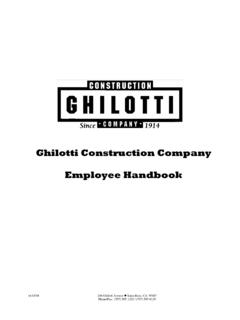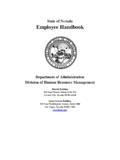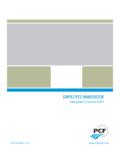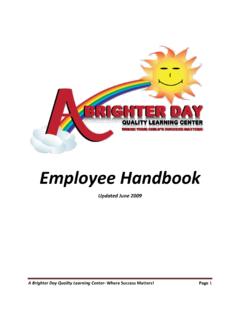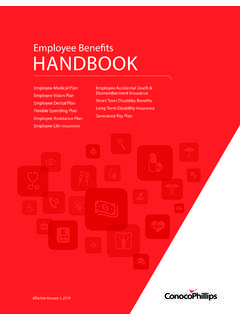Transcription of EMPLOYEE HANDBOOK AND POLICY MANUAL - CHR …
1 CHR SERVICES, EMPLOYEE HANDBOOK AND POLICY MANUAL Revised Preface The policies in this EMPLOYEE HANDBOOK apply to employees working for CHR Services, , CHR Solutions, Inc., and all their affiliated companies and wholly-owned subsidiaries. CHR Services affiliates and subsidiaries contract with the Company for its employees services. Any references to CHR Services ( the Company ) also apply to its affiliates and subsidiaries. These policies represent legal guidelines required by the federal government unless a state law is more stringent. Specific state laws dictate some policies that affect employees who work or reside in that state. The Company retains the right to alter the provisions of this EMPLOYEE HANDBOOK in writing or otherwise, with or without notice. POLICY changes can only be made by the Chief Executive Officer or Chief Operating Officer of the Company or designee.
2 No supervisor or manager has the authority to modify the policies in this EMPLOYEE HANDBOOK . Each EMPLOYEE is expected to acquaint himself/herself with, and acknowledge, the Company s policies when first hired and then each year thereafter. The Company s policies are available on the Company Intranet. All policies are posted there and updated regularly. Employees will be notified of changes through the Intranet, Company emails or by other written means. It is the EMPLOYEE s responsibility to view these documents and educate himself/herself on Company policies. The contents of this EMPLOYEE HANDBOOK replace all previous POLICY manuals, handbooks and similar materials, which are no longer in effect. Table of Contents 1. CODE OF BUSINESS ETHICS .. 1 Outside Activities .. 1 Non-disclosure of Confidential Information .. 2 Acceptance of Favors and Gratuities.
3 2 Intellectual Property, Trade Secrets and Proprietary Products .. 3 Political Contributions .. 3 Professional Conduct .. 4 EMPLOYEE Conduct and Work Rules .. 4 Professional Appearance .. 5 Customer Care .. 7 2. LEGAL AND 9 Legal Disclaimer .. 9 Handling Legal Documents from Law Enforcement Agencies .. 9 News Media Inquiries .. 10 Equal Employment Opportunity .. 10 Immigration Law Compliance .. 11 Disability Accommodation .. 11 Discrimination and Harassment .. 12 Privacy .. 14 3. EMPLOYMENT .. 17 Nature of Employment .. 17 Employment 17 Employment Documentation .. 18 Employment Opportunities .. 18 Independent Contractors .. 18 Hiring Relatives .. 20 Remote Workers .. 20 Personnel Files and Employment Verification .. 20 EMPLOYEE Issue Resolution .. 21 Termination of Employment .. 22 Attendance and Punctuality.
4 23 4. EMPLOYEE DEVELOPMENT .. 24 Performance Evaluations .. 24 Performance Improvement and Disciplinary Process .. 24 5. COMPENSATION AND BENEFITS .. 26 Compensation .. 26 EMPLOYEE Recognition and Awards Programs .. 26 Unemployment Compensation .. 29 Benefits .. 29 Company Holidays .. 30 Vacation .. 31 Sick Leave .. 32 Bereavement Leave .. 33 Leaves of Absence .. 34 Jury Duty .. 38 Educational Assistance .. 39 Fitness/Health Club Reimbursement .. 40 6. SAFETY AND SECURITY .. 41 Safety and Healthful Work 41 Job-related Injury or Illness .. 41 Substance Abuse .. 42 Smoking/Tobacco Use .. 43 Pandemic Outbreak .. 43 Inclement Weather and Office Closings .. 44 Building Security .. 45 Emergency Evacuation .. 46 Parking .. 47 Company Property .. 47 7. INFORMATION MANAGEMENT .. 47 Computer and Email Use.
5 47 Internet Use .. 48 Social Networking Sites .. 50 Purchase of Information Technology (IT) Hardware & Software .. 50 Computer Assignments .. 51 Mobile Telephones .. 51 Virus Protection .. 53 Password Protection .. 53 Remote Access .. 56 System Monitoring .. 58 8. ACCOUNTING, FINANCE AND ADMINISTRATION .. 58 Department Operations .. 58 Schedule of Authority .. 58 Travel and Entertainment .. 59 International Travel .. 61 Corporate Credit Cards .. 63 Driving On Company Business .. 64 Document Management/Retention .. 66 Obsolete Equipment and Furniture .. 67 9. TIME ENTRY AND PAYROLL .. 68 Business Hours .. 68 Time Entry .. 68 Payroll .. 69 Overtime Pay .. 70 Night or Weekend Shift Premium Pay .. 70 On-Call .. 71 Severance Pay .. 73 6/27/2013 Copyright 2010 CHR Solutions, Inc. All Rights Reserved Page 1 CHR Confidential and Proprietary 1.
6 CODE OF BUSINESS ETHICS A high standard of personal and professional ethics is expected of all Company employees. All employees will be required to sign a statement in which they pledge to abide by the Company s Code of Business Ethics. Any EMPLOYEE who violates the Code of Business Ethics will be subject to disciplinary action up to and including termination of employment and other legal remedies available. If any EMPLOYEE is uncertain about a particular situation that may arise, he/she should discuss it with his/her manager, a Company officer or the Human Resources Director. Employees at all levels and locations are not permitted to: Perform work either directly or indirectly for other firms, clients or companies for compensation when such work is provided by the Company, without the written permission of a Company officer; Own, either directly or indirectly, more than a 3% interest in any entity competing directly or indirectly with the Company, without the written consent of a Company officer.
7 A Company officer may not own more than a 3% interest in any other entity competing directly or indirectly with the Company without the written consent of the Board of Directors; Serve as director, corporate officer, or EMPLOYEE of, or perform services or consulting work for, any organization which might supply goods or services to the Company or compete with the Company, without the written permission of a Company officer, or in the case of a Company officer, without the written permission of the Board of Directors; Influence in a manner unfavorable to the Company, negotiations or transactions between the Company and its clients, suppliers, contractors, customers or other outside parties because of personal, commercial or financial interest in the outcome of the negotiations; or Perform tasks for other firms when the project has been designed, engineered or will be inspected by the Company or its employees.
8 Outside Activities Outside activities, which interfere with Company job performance, work schedule, duties or responsibilities, are not permitted. Serving as director, corporate officer or EMPLOYEE of, or performing services or consulting work for, any organization which supplies goods or services to the Company or competes with the Company, is not permitted without the written permission of a Company officer, or in the case of a Company officer, without the written consent of the Board of Directors. 6/27/2013 Copyright 2010 CHR Solutions, Inc. All Rights Reserved Page 2 CHR Confidential and Proprietary Non-disclosure of Confidential Information It is very important for employees to maintain the confidentiality of all Company and client confidential and proprietary information they receive, whether it is provided in oral, written, visual, computerized or other form, and not disclose such information to any third party, except as authorized by the client, a Company officer in writing, or to the extent required in the performance of duties on behalf of the Company.
9 Therefore, all employees will be required to sign a Non-disclosure Agreement as a condition of employment or, if none is on file, as a condition of promotion. Further, the EMPLOYEE agrees that the Company s confidential and proprietary information is, and at all times shall remain, the property of the Company. No use of such information is permitted and no grant under any of the Company s intellectual property rights is given, including any licenses. All information developed by Company employees for, or on behalf of, the Company s clients is considered to be trade secrets and proprietary information owned by the Company. The EMPLOYEE agrees to return all confidential and proprietary information in record bearing or other tangible form, any copies, and any property or equipment supplied to the EMPLOYEE by the Company upon termination of employment or at any time at the Company s request.
10 The EMPLOYEE s obligation to keep confidential and restrict the use of the Company s proprietary information and trade secrets shall remain in effect throughout the EMPLOYEE s employment with the Company and for a period of two years after the EMPLOYEE leaves the Company. All inquiries regarding employment of a present or former EMPLOYEE should be referred to the Human Resources Department. This involves work history, type of position held, responsibilities, and any other information related to the person s employment history. The contents of an EMPLOYEE s assigned mailbox shall be regarded as confidential for the intended recipient. If there is a need to view contents of another s mailbox, or to open another EMPLOYEE s mail, permission from the intended recipient must be granted. Employees should take appropriate measures to shred and/or destroy unneeded confidential information, while adhering to the Company s Document Management/Retention POLICY Acceptance of Favors and Gratuities No EMPLOYEE may accept a monetary gratuity from a vendor, contractor or client.

![[Your Organization] EMPLOYEE MANUAL](/cache/preview/0/f/f/f/b/8/f/9/thumb-0fffb8f985b2e8b84075d99f9b92be94.jpg)
